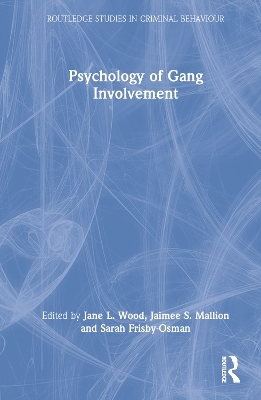
Psychology of Gang Involvement
Routledge (Verlag)
978-1-032-15151-9 (ISBN)
Psychology of Gang Involvement expands existing knowledge by applying psychological knowledge to gangs, including how gang members think, their mental and emotional well-being, and their perceptions of gang involvement, as well as issues relating to gang prevention and intervention strategies.
This book offers readers a clearer understanding of the important role that social psychological processes play in the formation and maintenance of gangs and gang membership. It will enhance readers’ understanding of gang members’ social cognition, emotional intelligence, well-being, and mental health, as well as how these factors potentially promote and sustain individual gang involvement. Readers will discover also how these important psychological characteristics vary according to an individual’s commitment to a gang. Organized in three sections, the first focuses on issues relevant to theoretical perspectives of gang involvement. Chapters include detailed examinations of a gang member’s experiences and the implications of these for theoretical development, and considerations of the importance of social and psychological issues such as group processes and levels of commitment to gang membership to, understand and explain involvement in gangs. The second section centers on issues such as adverse childhood experiences and trauma, and examines their links to male and female gang membership as potential risk factors and outcomes of gang involvement. The section concludes by contemplating how the mental health, traumatic experiences, and involvement in violence compares between gang members and other violent men in adulthood. The final section considers current responses to gang membership by evaluating individual and group-based approaches to gang prevention and intervention strategies, and concludes with a theoretical conceptualization of how a strengths-based approach could work to reduce gang involvement.
This book will be a useful text for a wide range of readers interested in, or working with gang members, including academics and students, practitioners, youth workers, clinicians, and criminal justice agents.
Jane L. Wood is Professor of Forensic Psychology, Registered and Chartered Forensic Psychologist in the Centre of Research and Education, School of Psychology, University of Kent, UK. She has published widely for the past 20 years on the psychology of both prison and street gang involvement. Jaimee S. Mallion is Doctor of Forensic Psychology at London South Bank University. Her areas of interest are the formation, maintenance, disengagement, and mental health of street gang members, and offender rehabilitation. She focuses on applying the Good Lives Model as a framework for street gang intervention. Sarah Frisby-Osman completed her doctorate in Forensic Psychology at the University of Kent. Having worked with vulnerable youth since 2012, her research on gang-affiliated youth examines the interplay between gang membership and behavioral, emotional, and psychological factors. She currently works as Research Development Manager at the University of Sussex.
Part 1: Theoretical Perspectives of Gang Membership
Chapter 1: A Case Study Examination of Gang Involvement Using a Unified Theory Framework
Chapter 2: Bonds in Gangs: Understanding the Importance of Group Processes Within Street Gang Members’ Cognition
Chapter 3: Gang Member Typologies and Levels of Embeddedness
Part 2: Psychological Characteristics of Gang Members
Chapter 4: The Role of Trauma in the Developmental Trajectories of Gang-Involved Youth
Chapter 5: Like a Moth to a Flame: Behavioral Disorders and Gangs
Chapter 6: The Psychology of Adult Gang Involvement
Part 3: Reducing Gang Involvement
Chapter 7: Responding to Street Gangs and Street Gang Members: Integrating Public Health and Criminal Justice
Chapter 8: Preventing and reducing gang membership
Chapter 9: Novel Approach to Gang Intervention: Applying the Good Lives Model
| Erscheinungsdatum | 26.10.2022 |
|---|---|
| Reihe/Serie | Routledge Studies in Criminal Behaviour |
| Zusatzinfo | 6 Tables, black and white; 5 Line drawings, black and white; 5 Illustrations, black and white |
| Verlagsort | London |
| Sprache | englisch |
| Maße | 156 x 234 mm |
| Gewicht | 620 g |
| Themenwelt | Geisteswissenschaften ► Psychologie ► Allgemeine Psychologie |
| Geisteswissenschaften ► Psychologie ► Entwicklungspsychologie | |
| Geisteswissenschaften ► Psychologie ► Sozialpsychologie | |
| ISBN-10 | 1-032-15151-X / 103215151X |
| ISBN-13 | 978-1-032-15151-9 / 9781032151519 |
| Zustand | Neuware |
| Haben Sie eine Frage zum Produkt? |
aus dem Bereich


